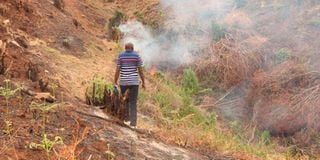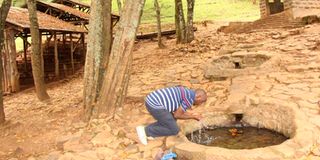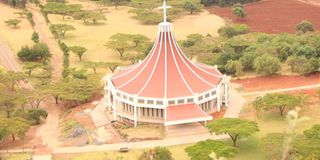Looming death of Subukia Shrine

Environmental activist Anthony Njugi assesses the extent of deforestation at the Subukia Shrine in Nakuru County.
What you need to know:
- Some of the springs at the shrine, which also serve as a water catchment, are slowly drying up.
- Forest canopies that also played host to wildlife, including antelopes, colobus monkeys and birds are slowly disappearing.
Once lush greenery, the Subukia National Shrine has been a destination of pilgrims from far and wide, who thronged it for spiritual nourishment.
The chirping birds and fresh air made the pilgrimage peaceful, quiet and serene.
But everything is not right at the shrine, one of the largest in the country.
The sacred place is now threatened by deforestation from illegal logging and encroachment by area residents.
So bad is the situation that, some of the springs at the shrine, which also serve as a water catchment, are slowly drying up.

Environmental activist Anthony Njugi drinking water from a dried up spring at Subukia Shrine.
The springs drain their waters into River Subukia, which flows into Lake Bogoria. The water that is believed to heal, may soon vanish if the encroachment is not stopped.
Some pilgrims come with jerrycans to fetch the water to take back home. They believe sprinkling it around their homes brings them God's blessings.
The water levels at River Subukia have also drastically reduced.
Forest canopies that also played host to wildlife, including antelopes, colobus monkeys and birds are slowly disappearing.
If nothing is done, the national heritage site, that stands atop the Subukia Hills on a 300-acre plot will lose its splendour.
When the Nation visited the shrine on Tuesday, it established that charcoal business and illegal logging thrive in sections of the shrine, threatening to deplete the forest cover.
Unscrupulous individuals have invaded the shrine, turning huge sections into farms.
Environmental activist Anthony Njugi says encroachment on the forest has affected rainfall in the area and its environs.
“The mighty forest is shrinking at an alarming rate and nobody is raising concern. Relevant State agencies, the Nakuru County Government and the Catholic Church that runs the shrine, have all been silent,” he said.
Nation investigations found that rogue local administrators, timber merchants and some politically connected locals are engaged in lucrative charcoal business and farming at the shrine.

An aerial image showing the extent of encroachment at Subukia Shrine in Nakuru County.
To a visitor, the shrine now looks like an expansive private farm.
Mr William Obara, a village elder, in the area told the Nation that wanton destruction of the forest had shocked residents.
“The illegal logging and charcoal burning threaten food security. Subukia is one of the food baskets in Nakuru County,”he said.
Father Lawrence Mbogo of Nakuru Catholic Diocese that runs the shrine promised to take action, as did the county government.
The latter said it is not aware of the illegal activities at the shrine.






